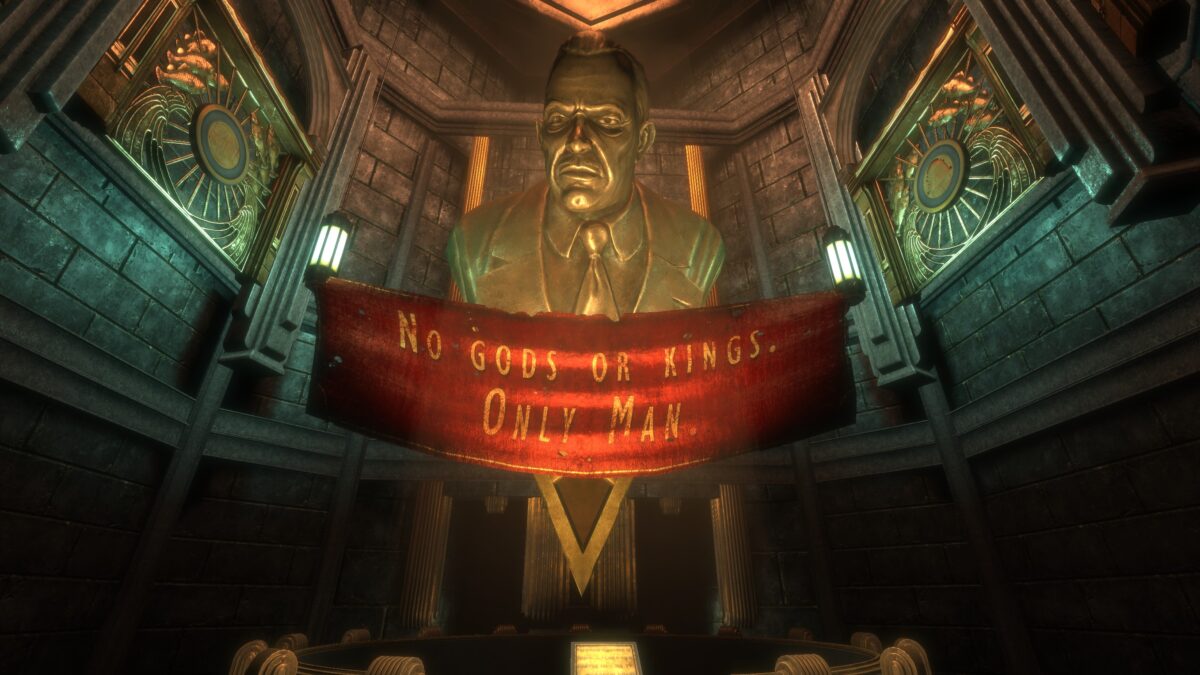Looking for the Quick Review?
Retro Review is a deep-dive series focused on my extensive backlog of unplayed video games. Today’s entry is Bioshock.
I had never played Bioshock. I had friends who enjoyed it when it came out in 2007. I picked it up on Steam at some point, probably during a sale when I convinced myself I’d play it in the very near future. I even played through and thoroughly enjoyed Bioshock: Infinite soon after that game’s release. But I never touched any piece of the Rapture saga. Then the pandemic attacked.
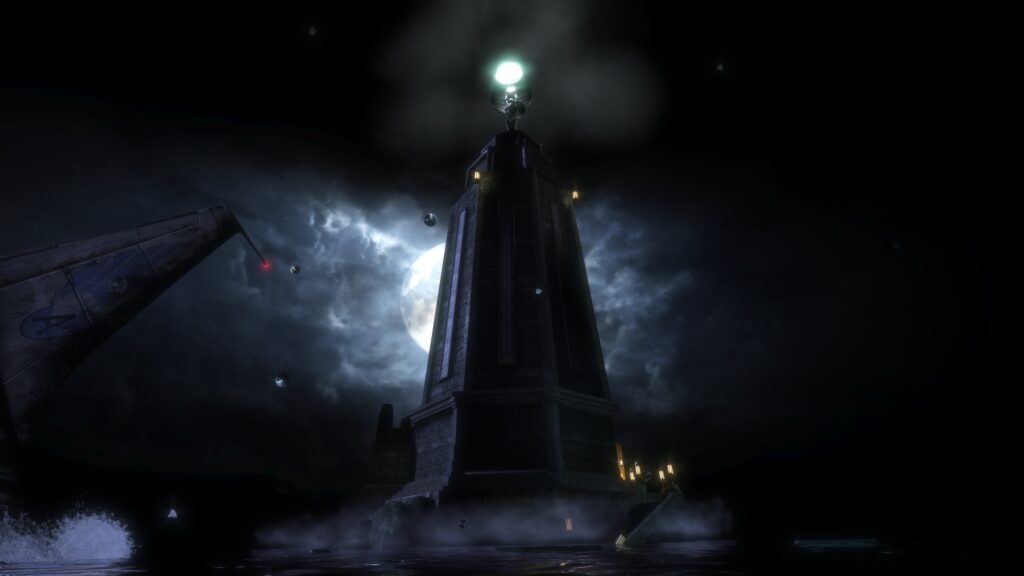
For the uninitiated, Bioshock is a narrative first person shooter set in Rapture, an underwater libertarian metropolis in its twilight years following major unrest and internal collapse. It’s the spiritual successor to the System Shock series, which I’ve never played. If you have, that might mean something to you.
Straight away, Bioshock‘s strength is its world. The city of Rapture is engrossing and fascinating throughout, owing in large part to how unique it is. Each playing space in the game’s story has a place in the world of Rapture, with each working to flesh out its overall character. An undersea forest produces the city’s oxygen, a sweatshop fishery its food. Perhaps most interesting are Rapture‘s venues of excess, its theaters and markets where art, science, and culture once flourished so long as they could draw the attention of the enterprising capitalist class.
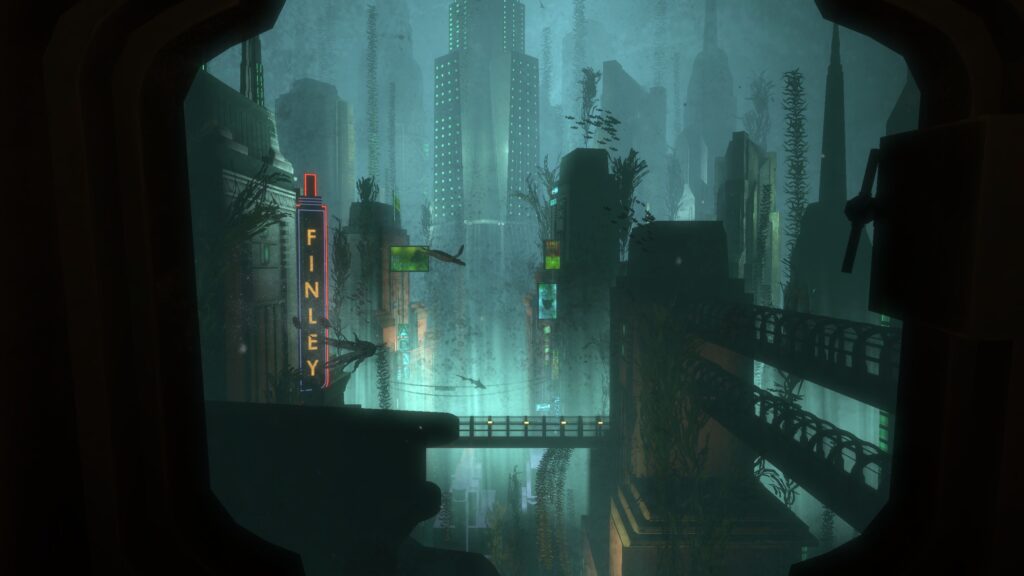
Rapture’s backdrop tells its story. Just as the neon lights and seafaring metro cars appeal to an image of urban success, the morphing of the city under the weight of its own sin offers a porthole view into its ultimate downfall. Rapture‘s once-advanced medical institutions now stand only as a grotesque monument to vanity, where audio diaries tell the stories of citizens forced into surgeries undertaken in pursuit of physical perfection. The mutant workmen entrusted with the city’s maintenance now wander its halls charged instead with the protection of its equally-mutated children as they harvest the lifeforce of deceased pedestrians. The local museum now serves as something of a military training facility.
Much of Bioshock‘s story is delivered through the combined effort of its world and audio diaries scattered throughout it. You enter Rapture as a newcomer, the sole survivor of an oceanic plane crash that just happened to leave you stranded within swimming distance to the nautical metropolis’s lighthouse entrance. From there, you learn and come to understand the city organically, from its anti-authoritarian roots to its paranormal narcotic-fueled downfall.
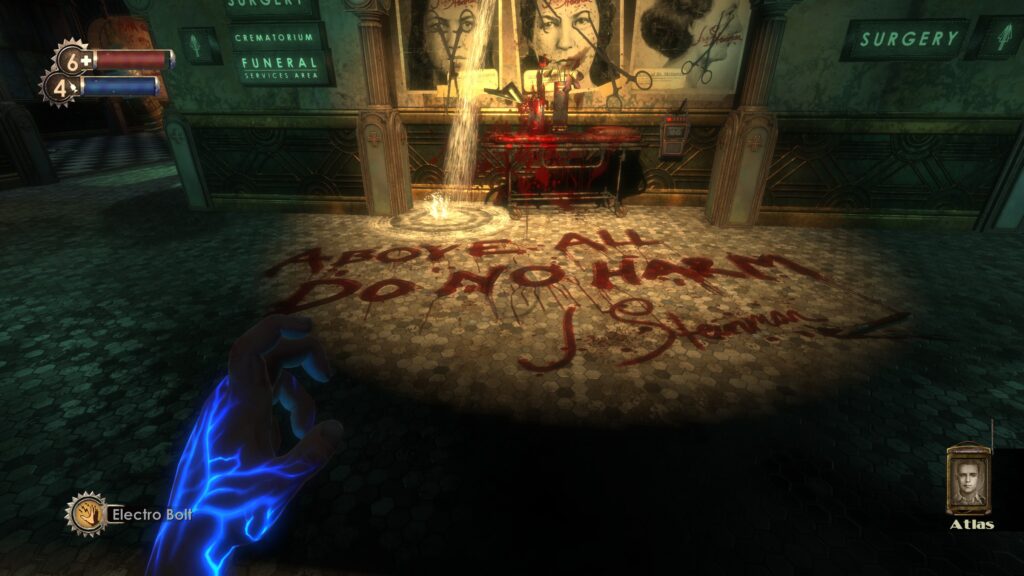
Bioshock‘s actual gameplay takes some pretty clear inspiration from classic shooters, inheriting gameplay elements like the ability to hold and switch between a set of seven different weapons at will. Combat comes with a decent amount of variation, and you’ll probably have to use it. Ammo in Rapture is pretty scarce, and while it’s unlikely you’ll ever find yourself completely without it, I found running out of bullets in my pistol or shells in the shotgun to be a fairly regular experience.
Each weapon offers a predictably different playstyle requiring new angles of approach, but most weapons also come with alternate ammunition types that can be swapped in and out at will to tweak performance in battle. The pistol, for example, can fire standard bullets as well as specialized antipersonnel and anti-armor ammo. Some of the weapons unlocked later in the game, like the chemical launcher and crossbow, have more unique alternative fire options.
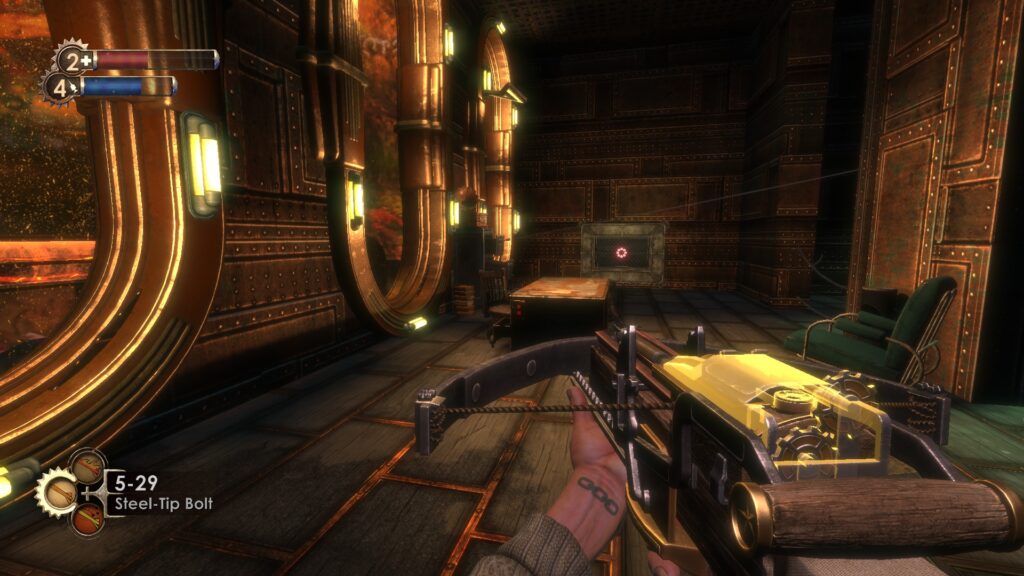
The more significant element of combat variability comes in the form of plasmids. In-universe, plasmids are consumer pharmaceuticals that alter the human genetic structure to provide individual enhancements. In-game, they’re Bioshock‘s take on magic spells. Common plasmids I used throughout my playthrough include an electric shock that stuns enemies and travels through water, a fireball that sets them alight, and an icy freeze that renders foes prone to shattering. These are also the most vanilla and wizard-y of the plasmids unlocked throughout the game. Others entrance enemies to fight for you, launch a swarm of insects, and summon a doppelganger to attract damage. Altogether, the plasmids aren’t incredibly complex, but they do add a layer of combat strategy atop the typical point-and-shoot gameplay loop.
Rapture’s halls, homes, and businesses are guarded by a variety of security automata that can be hacked to the player’s benefit. Hacking in Bioshock is a very slightly modified take on the pipe rotation game we’ve all played. Liquid enters on one side of a grid and your goal is to get it to another by moving and adjusting the pipes in the grid’s cells before the liquid reaches the end of the line. It’s limited in its complexity, but not unfun. My playstyle naturally shifted into something of a hacking-focused run as I collected upgrades that made the system more lenient by removing hazards and rewarded successful hacks with health bonuses.
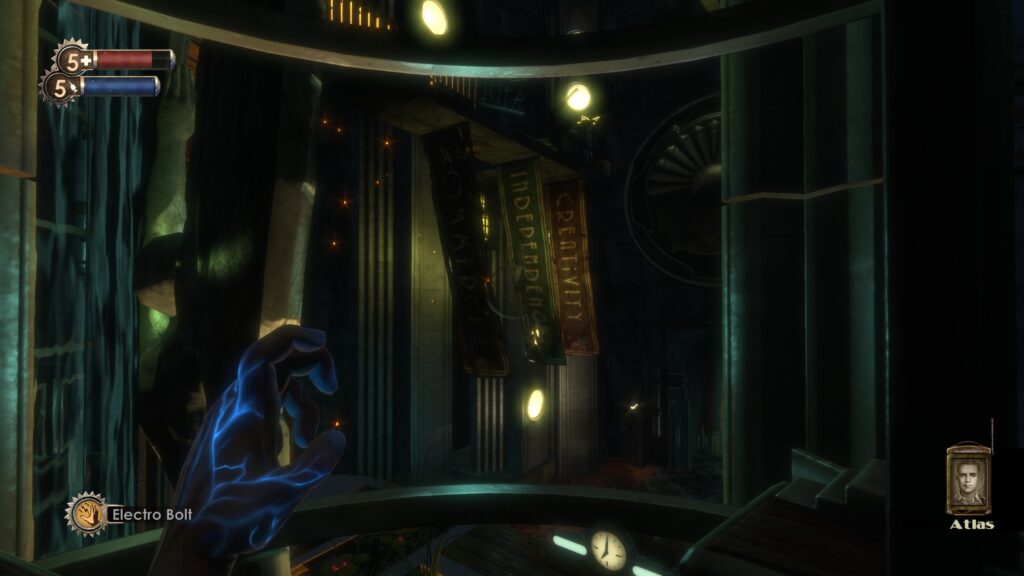
Upgrades in Bioshock are kinda neat, distributed in the form of specialized passive perk tonics that alter weapon damage, make hacking easier, discharge electric shocks against melee attackers, etc. The tonics themselves are unlocked through gameplay or purchased at themed (if racism counts as a theme) vending machines. Once a tonic is unlocked, it’s yours to keep, but only a set number of tonics can be active at a time. These active tonics can be changed at will by interacting with a (non-racist) vending machine, and additional slots can be purchased the same way. Overall, the selection is pretty tame, and (passive) adjustments are minimal, but it’s there and it offers some decent variety, especially early on.

Despite having benefited from a remaster in 2016, Bioshock bears some age-related scarring. The game’s controls sometimes feel outdated. Swapping between weapons using the number keys is a no-brainer, but, even in a pre-weapon wheel design schema, using the function keys for plasmids felt weird. That’s surmountable, and probably more a personal thing than a universal annoyance. The game’s handling of menus and some keystrokes, on the other hand, is bothersome. The infrastructure for selecting and replacing upgrade tonics feels like it was hastily ported from console and maintains a clunky, unintuitive feel. Saving the game cues up a full loading screen each time. Something I didn’t expect to have a problem with was adjusting my computer’s volume. I usually use built-in buttons on my keyboard to change sound levels when in-game, something I’ve never really run into any problems with until now; in Bioshock, the keys are (somehow) bound by default to opening and closing one of the game’s menus, which was an inconvenience through most of my playthrough but also once ended up locking me in place, totally unable to move. I have no idea what caused that, and it’s only through some lucky button-mashing that I regained control of my character. Maybe try to decide on a comfortable volume before loading up the game.
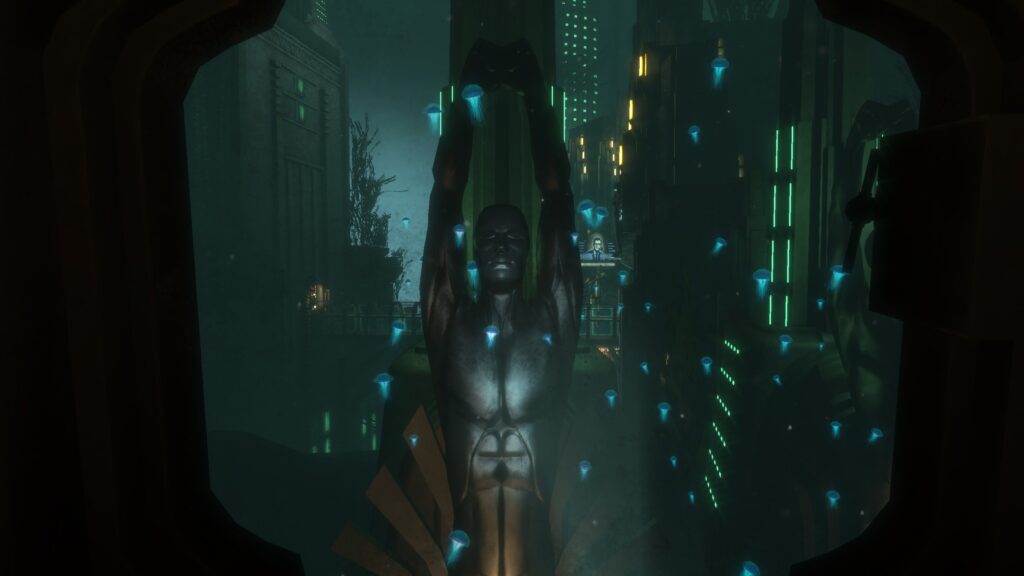
Overall, I enjoyed my time in Rapture (as much as anyone can be expected to enjoy their stay in a collapsing libertarian utopia). Bioshock is fun, with enough neat features, enemies, and locations to keep a story-focused FPS player interested. It’s also a decently succinct experience; I clocked in around ten hours before hitting the credits. It’s also a particularly effective distraction for those of us avoiding the realities of quarantine.
Quick Review
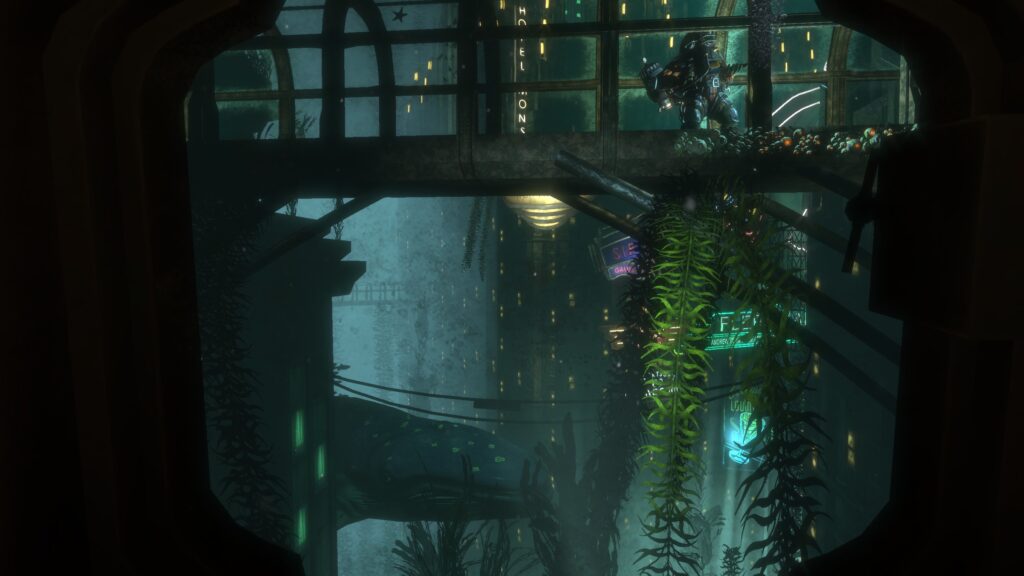
Game: Bioshock
Made by: 2K Boston, 2K Australia
Published by: 2K Games
Available for: MacOS, PlayStation 3, PlayStation 4, Windows PC, Xbox 360, Xbox One
Rapture’s collapsing ideological dystopia provides a consistently-engaging backbone for this narrative-focused first person shooter.
CONTENT
Microtransactions: None
Tedium: None
Violence: Graphic
Content: Blood, Depictions of Mutilation
FEATURES
- First person shooter combat
- Story focused
- Semi-open world
- Passive character perks
- Weapon upgrades

WHAT I LIKED
- The World of Rapture
- Passive, audio-based story and exposition
CONCERNS
- Some quirky controls on PC
- Some outdated/hastily-ported UI elements
WHO’S IT FOR?
Bioshock is an excellent recommendation for fans of narrative-focused single player games with first person combat. Those in search of a deeper RPG experience or multiplayer should look elsewhere.

STATISTICS
From Steamspy unless otherwise noted.
Average Playtime*: 10 hours, 15 minutes
Average Cost per Hour**: $1.95
Median Playtime*: 2 hours, 48 minutes
Median Cost per Hour**: $7.27
* Playtime rounded to the nearest quarter-hour
**Costs calculated using a price of $20.00
